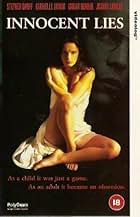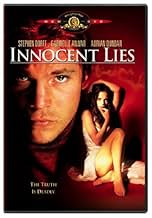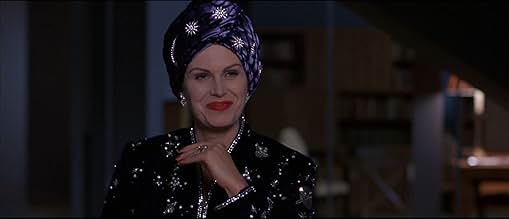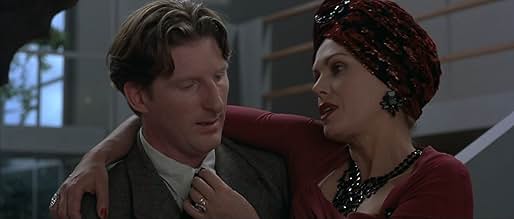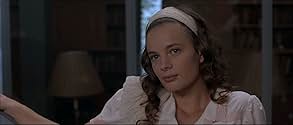VALUTAZIONE IMDb
4,5/10
1181
LA TUA VALUTAZIONE
Aggiungi una trama nella tua linguaBritish detective investigates friend's death in 1938 French town. Uncovers illicit affair, Nazi ties, aristocratic family's secrets while pursuing the killer's identity.British detective investigates friend's death in 1938 French town. Uncovers illicit affair, Nazi ties, aristocratic family's secrets while pursuing the killer's identity.British detective investigates friend's death in 1938 French town. Uncovers illicit affair, Nazi ties, aristocratic family's secrets while pursuing the killer's identity.
- Regia
- Sceneggiatura
- Star
Recensioni in evidenza
I believe Towards Zero to be one of Christie's best and when I read there was an adaptation that her usually quite tolerant estate had declined any involvement with (an extremely rare occurrence to the chagrin of some Christie purists), I went out to search for it.
The setting is both beautiful and poignant. An Art Deco Villa on a clifftop in 1938 France, undercurrents of the coming war rippling even through the lives of the well-off family at the centre of the story.
British detective Adrian Dunbar, along with his small daughter, visits to bury his old friend, a fellow cop, who apparently and very suddenly has committed suicide. It appears said cop came to investigate the death of a young member of the aptly named Graves family many years ago and never left. What his relationship with the Graves' exactly entailed we never find out (the matriarch insists they had an affair, but her word is as good as anyone else's in this movie, which is no good at all). I guess it would count as a spoiler if there was anything to spoil, that we also never find out what happened to him.
Two things are quite clear from the start. The slimy Oxford student son Jeremy is the most likely suspect and his relationship with his sister is not sisterly in the least. Again, no surprises will reveal themselves on either account.
The hard boiled detective naturally falls immediately under the spell of the beautiful daughter Celia and risks his career to help her escape - from what exactly, not even she herself seems to know. Numerous other storylines are woven (and mostly dropped without any resolution). Various females are upset with the detective, but since they won't tell him why, the film also doesn't care any longer. Motives of anyone are foggy at best and often change from scene to scene. Some sequences are almost Lynchian in their absurdity and their lack of any connection to the plot, but feel much more accidental. The most consistent part is the camera following around young Celia to expose her body from every angle possible.
The ending scene wakes memories rather more of Dial M for Murder than Towards Zero, but I doubt either would like to be associated with this film. In fact, despite some effort, I could find no traces of the intricate plot Christie had woven for Towards Zero. No perfect alibi, no sinister end goal, no double bluff. Instead we get to see Gabrille Anwar's breasts under a variety of semi-translucent fabrics. I guess that counts for something.
The setting is both beautiful and poignant. An Art Deco Villa on a clifftop in 1938 France, undercurrents of the coming war rippling even through the lives of the well-off family at the centre of the story.
British detective Adrian Dunbar, along with his small daughter, visits to bury his old friend, a fellow cop, who apparently and very suddenly has committed suicide. It appears said cop came to investigate the death of a young member of the aptly named Graves family many years ago and never left. What his relationship with the Graves' exactly entailed we never find out (the matriarch insists they had an affair, but her word is as good as anyone else's in this movie, which is no good at all). I guess it would count as a spoiler if there was anything to spoil, that we also never find out what happened to him.
Two things are quite clear from the start. The slimy Oxford student son Jeremy is the most likely suspect and his relationship with his sister is not sisterly in the least. Again, no surprises will reveal themselves on either account.
The hard boiled detective naturally falls immediately under the spell of the beautiful daughter Celia and risks his career to help her escape - from what exactly, not even she herself seems to know. Numerous other storylines are woven (and mostly dropped without any resolution). Various females are upset with the detective, but since they won't tell him why, the film also doesn't care any longer. Motives of anyone are foggy at best and often change from scene to scene. Some sequences are almost Lynchian in their absurdity and their lack of any connection to the plot, but feel much more accidental. The most consistent part is the camera following around young Celia to expose her body from every angle possible.
The ending scene wakes memories rather more of Dial M for Murder than Towards Zero, but I doubt either would like to be associated with this film. In fact, despite some effort, I could find no traces of the intricate plot Christie had woven for Towards Zero. No perfect alibi, no sinister end goal, no double bluff. Instead we get to see Gabrille Anwar's breasts under a variety of semi-translucent fabrics. I guess that counts for something.
I am a passionate lover of movies and actors. American, foreign, documentaries, independent- all kinds of movies. I usually try to find the silver lining in every movie I watch. Hard work and risk taking deserve at least that much from a viewer. This movie was very irritating to watch. It didn't even follow it's own plot. It would pick up and drop story lines randomly without any logic. Relationships were contrived, some to shock, some for lack of better ideas. Acting was not very inspired, it's hard to see how could it possibly be with this script. It was messy, unfinished and irritating. So much for silver lining on this one.
The cinematography of this film was brilliant, choice of location plus the genius of the camera work kept me enthralled with a shallow and convoluted plot that took red herring to waters it had never been to before. The little hamlet and eccentric interiors made an impossible film watchable, enjoyable even. The premise of the plot was the suicide or murder concept of the hero regarding the best friend and introduced in the first scenes. The rest of the movie was interwoven and seemingly totally disconnected scenes of incest or gratuitous pants dropping or bums in the buff. There were some of the scenes that served no purpose other than to expose an actor's body to the camera or tight shots of Adrian Dunbar's nose. It was as if the editors tossed the dailies up in the air and pasted them together quickly based on aesthetics rather than plot advancement. I think there was a plot at one time in the manuscript but it was discarded and the film became a series of patchwork scenes lacking cohesion. I was glad it was over though it was not easy to tell when that was going to happen because it could have been anywhere along the line. It was not a great film, a dozen yrs old and so aggravating it inspired me to take more time on it and write a 'review' on a pretty bad movie.
I tend to like movies like this one- quiet, destined to be seen on TV late at night after some red wine to quench insomnia. Yeah... some called it a bore, but so was Mansfield Park...to an extent. it's been quite a while since I have seen it and the details are a bit fuzzy, but if a movie of its rank made it in the realm of my daily wanderings, then it has to have at least one quality. Maybe I liked the setting,the cold morning air-the blue air that conveys darkness and mystery to most Poirot series or the landscapist pov it offered at times just to be changed with the eye of a mute detective at others. I almost liked those, but not quite. Being very fond of art, this movie reminded me of Tamara de Lempicka's paintings: very art deco, showing us more than just a glimpse of the 30s aristocracy, very daring without excelling in creativity. just that. the ending was unsurprising,not really a letdown but the deranged late 30s atmosphere, the uncontrollable animalism depicted in different character liaisons saved it.
....as Visconti showed it in a work such as "la cadeti dei degli" (1969) demands much more than "Innocent lies" 's director can do.Outside the brother and the sister ,and the cop (who is humming twice bribes of the old Irish tune "Carrickfergus" ;the connection with the movie escapes me,I am afraid),the other characters are only silhouettes and you have a feeling that some essential scenes are lacking ,for this a relatively short movie all the same (barely 90 min).Some subplots ,such as the first cop's investigation and suicide are only skimmed over.Ditto for the Jewish wife's scene.As for the incestuous sister's unfortunate fiancé ,he has two or three lines to say and that's it.
The users were harsh when they rated the movie and I can sadly find little fault with that.
The users were harsh when they rated the movie and I can sadly find little fault with that.
Lo sapevi?
- QuizThe original script was based on "Towards Zero," a novel by Agatha Christie. When Christie's daughter, Rosalind Hicks, reviewed the screenplay, she demanded that her mother should remain uncredited, and the character names changed. This was because of the inclusion of incest.
- ConnessioniVersion of Agatha Christie's Marple: Miss Marple - Verso l'ora zero (2007)
- Colonne sonoreQue Reste-t-il de nos Amours ?
Music by Charles Trenet and Léo Chauliac
Lyrics by Charles Trenet
Performed by Charles Trenet
I più visti
Accedi per valutare e creare un elenco di titoli salvati per ottenere consigli personalizzati
- How long is Innocent Lies?Powered by Alexa
Dettagli
- Data di uscita
- Paesi di origine
- Lingue
- Celebre anche come
- Innocent Lies
- Luoghi delle riprese
- Aziende produttrici
- Vedi altri crediti dell’azienda su IMDbPro
- Tempo di esecuzione1 ora 28 minuti
- Colore
- Proporzioni
- 2.35 : 1
Contribuisci a questa pagina
Suggerisci una modifica o aggiungi i contenuti mancanti


